Trigger is an animation studio known for its frenetic action scenes with the likes of Kill la Kill and Darling in the Franxx. Cyberpunk: Edgerunners doesn’t disappoint…when it has action scenes anyway. The anime is based on the video game of the same name, which I haven’t played.
The story follows a street kid named David who gets entangled in a cybernetic dystopia ran by feuding mega-corporations. He joins a group of black-market mercenaries, who are called edgerunners, to survive. He develops a close relationship with the group, particularly with a hacker named Lucy. As the story progresses, David and the gang get entangled with the deadly business war between the Arasaka company and Militech.
Let’s get the bad and the problematic out of the way. While I watched Cyberpunk I felt disappointment. Coated with neon visuals, the animation has an interesting feel to it, but this is marred by regular still-frame shots covered by character exposition that did little to develop the world or its story. It leans heavily on the fan-aspect of the game, which isn’t a bad thing. If you aren’t a fan of the game, the story may not resonate. The Neir: Automata anime, for example, does the same thing, and I enjoyed revisiting the story. Although, Cyberpunk is better animated on the whole. Cyberpunk’s action scenes certainly have the zaniness and over-the-top flare Trigger has become known for, but there’s a lot of recycling of frames and scenes between.
As a main character, David annoys me. While the other characters call him smart, his actions speak to his idiocy. He rarely thinks things through or communicates with Lucy. Nor does he have any internal motivation. All of his goals are set for him by other characters: his edgerunner group, his mother, Lucy. While some of his desire to support is laudable, he doesn’t have any contrasting internal motivation of his own. His brashness and arrogance make him a grating personality too. All-in-all, David feels too flat as a character for my taste. He’s the type of person I avoid socializing with in real life.
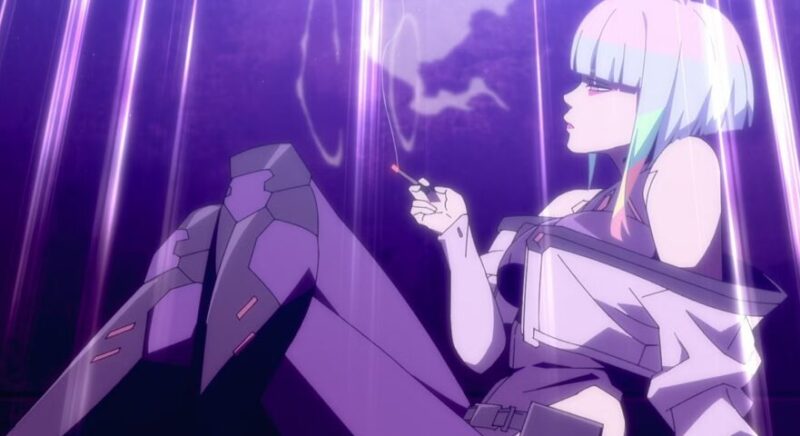
The world of Cyberpunk doesn’t bring anything really new to the Bladerunner and Ghost in the Shell foundation of this sci-fi genre. Cyber-psychosis, a form of insanity caused by too many cybernetic implants and the immune-suppressants required to prevent the body from rejecting the implants, isn’t new. It plays a major role in the story, and while interesting, Ghost in the Shell already played with the idea. But Cyberpunk takes the idea to interesting extremes.
The world of Cyberpunk needs more development. But again, I didn’t play the game, so I couldn’t catch the visual hooks or other details which tie into the lore the game no-doubt develops. It has interesting elements, but it felt basic compared to the world building of Ghost in the Shell. In fact, throughout my watch of the series–which I did enjoy despite my criticism–I kept wanting to go and watch Ghost in the Shell’s series. David, in particular, was the main reason why. Perhaps I’m getting too old for these sort of anime, but I find these impulsive protagonists dull and flat and annoying. Cyberpunk had many chances to deepen David as he struggled with a form of PTSD, but it didn’t. Instead, the story moves in a self-immolation direction that, in my mind, proves David as an egoist who wants to burn out in “glory.” Immaturity at its height from my perspective.
The story would’ve been better if it focused on Lucy. Lucy feels like a cross between Evangelion’s Rei and Ghost in the Shell’s Major. Where David is a flat character, Lucy hints at depth and complexity and thoughtfulness. She struggles with a past and a fate that’s forced upon her. She wants to escape it, which brain-dead David fails to understand even when she spells it out to him. He’s too wrapped up in his ego. While this interaction is realistic, the direction David goes leaves no room for redemption with Lucy. Lucy has complex motivations: revenge, love, hate, survival, loneliness, nihilism, and hope. More time should’ve been spent on Lucy and David’s relationship. If the story had done so, and kept with the direction of the ending, there would’ve been more impact. I may not have found myself muttering “What an idiot” at the end.
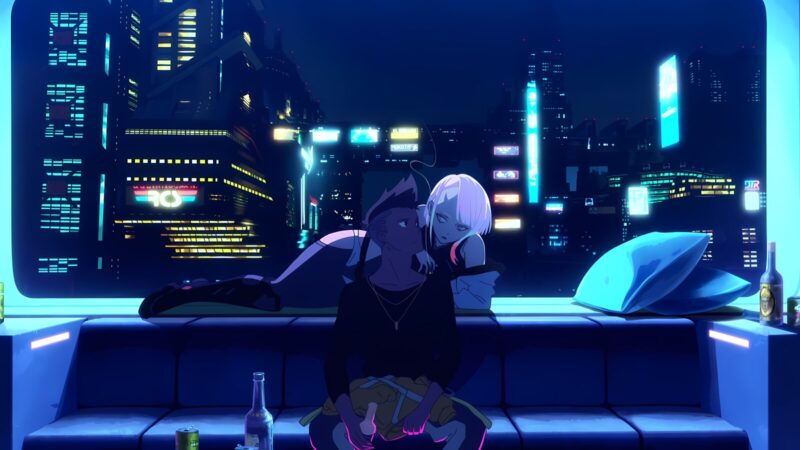
Cyberpunk has a lot of nudity in it, particularly of Lucy as she hacks systems. Like other Trigger titles, nudity has interesting symbolism for the story. In fact, the body discomfort Cyberpunk shows is the story’s most interesting theme. As the characters gain more cybernetic implants, they lose more of their humanity until their all-too-human mind can’t deal with it anymore. This is cyber-psychosis. Yet, the world requires people to increasingly cut away their humanity in order to survive and succeed. This power and body-acceptance problem provides interesting tension that isn’t explored to its full potential. Now, the story’s handling of this problem, particularly with David, provides a nice foil to Lucy’s quiet discomfort with her own “chrome” as the series hints at throughout. Where David embraces it with little hesitation, Lucy wishes she could be free of her implants. None of this is fully developed, sadly, because the story focuses on the edgerunner-corporation tangle. This body-problem theme plays into the nudity seen throughout the series. Nudity in Cyberpunk shows both the strength of the cybernetics and the vulnerability of the humanness that is slowly rejected. In Lucy’s case, her nudity is the most human of the characters. She does what she can to hide her implants whereas David and the others flaunt them. Nudity also represents emotional vulnerability. There’s a scene where David sits naked as his trauma haunts him. Despite the power of his technology-enhanced body, his nudity speaks to his weakness and frailty. Lucy is also nude in this scene, but her nakedness speaks of confidence and acceptance of her fate. In the scene, she presents several options for David to open up and change his trajectory. He fails to take them. In fact, there are at least 2 other chances to turn toward her that he rejects.
Cyberpunk while interesting, left me wishing it had better development. The world was interesting but left undeveloped within the anime. The game, no doubt, handles this, but the anime has to stand on its own. David teemed with potential as a deep character, but he became a egotistical externally-driven failure. This can be fine on its own, but he would’ve been better as a side character. Lucy shined bright, but her character remained largely unexplored. David and Lucy’s relationship failed to reach the depths the story sketched.
I approached the story expecting something akin to Ghost in the Shell, which is why I came away entertained but disappointed. Cyberpunk isn’t bad. It has some wonderful scenes, but it suffers from uneven animation and storytelling. It felt like it missed its potential.
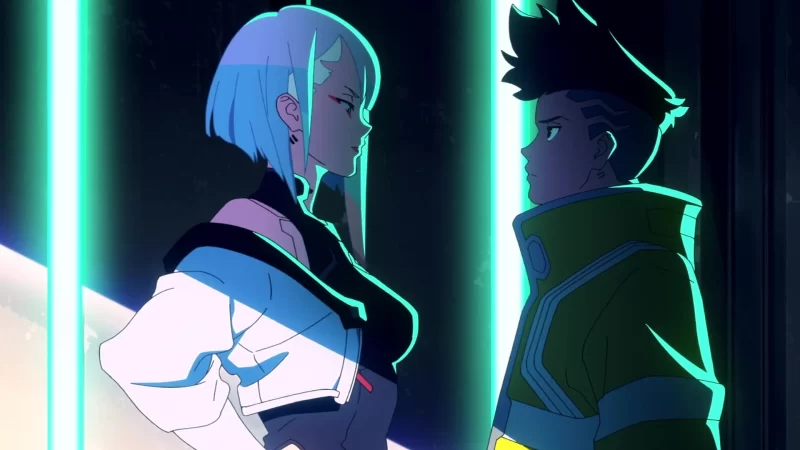
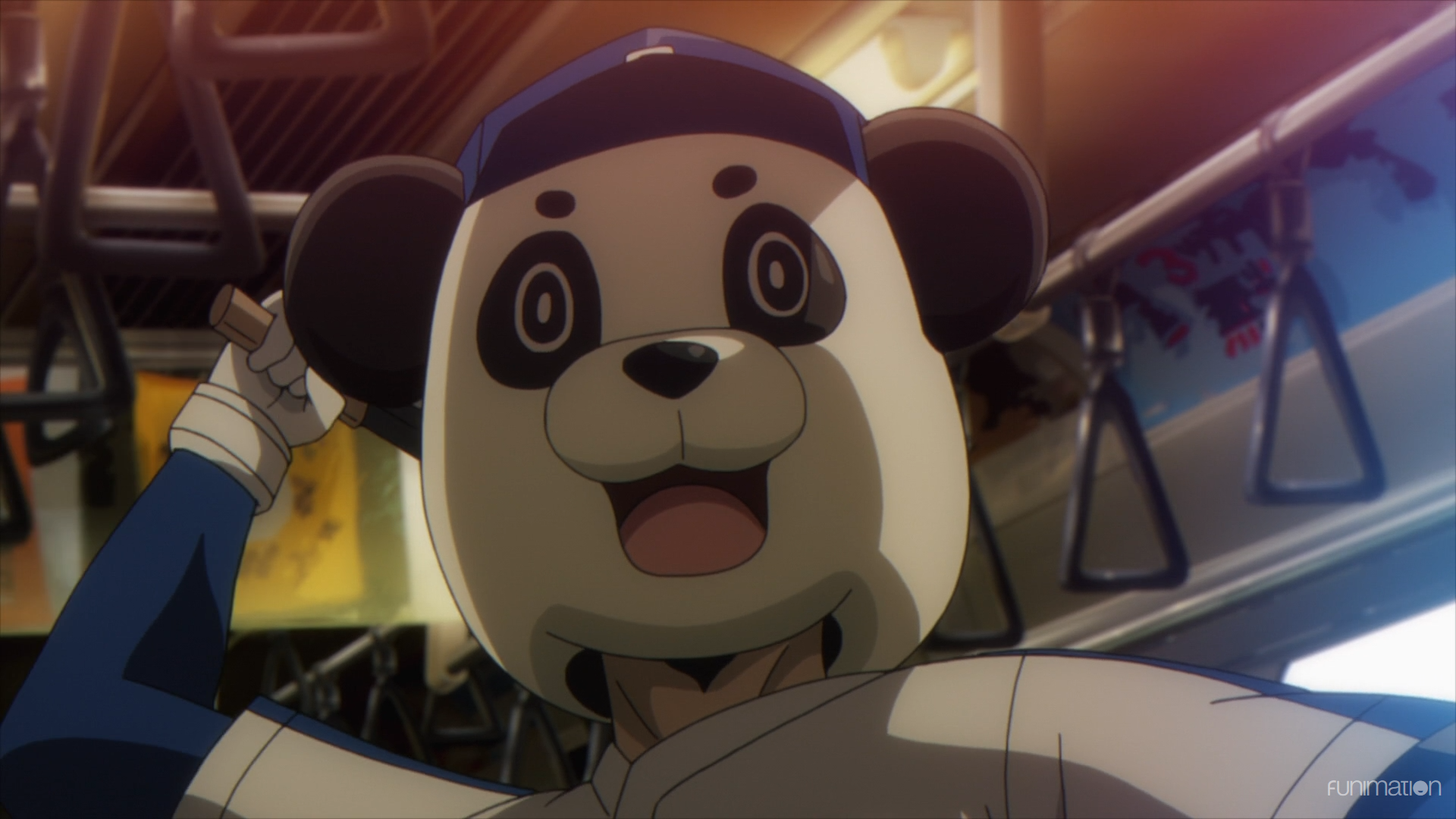

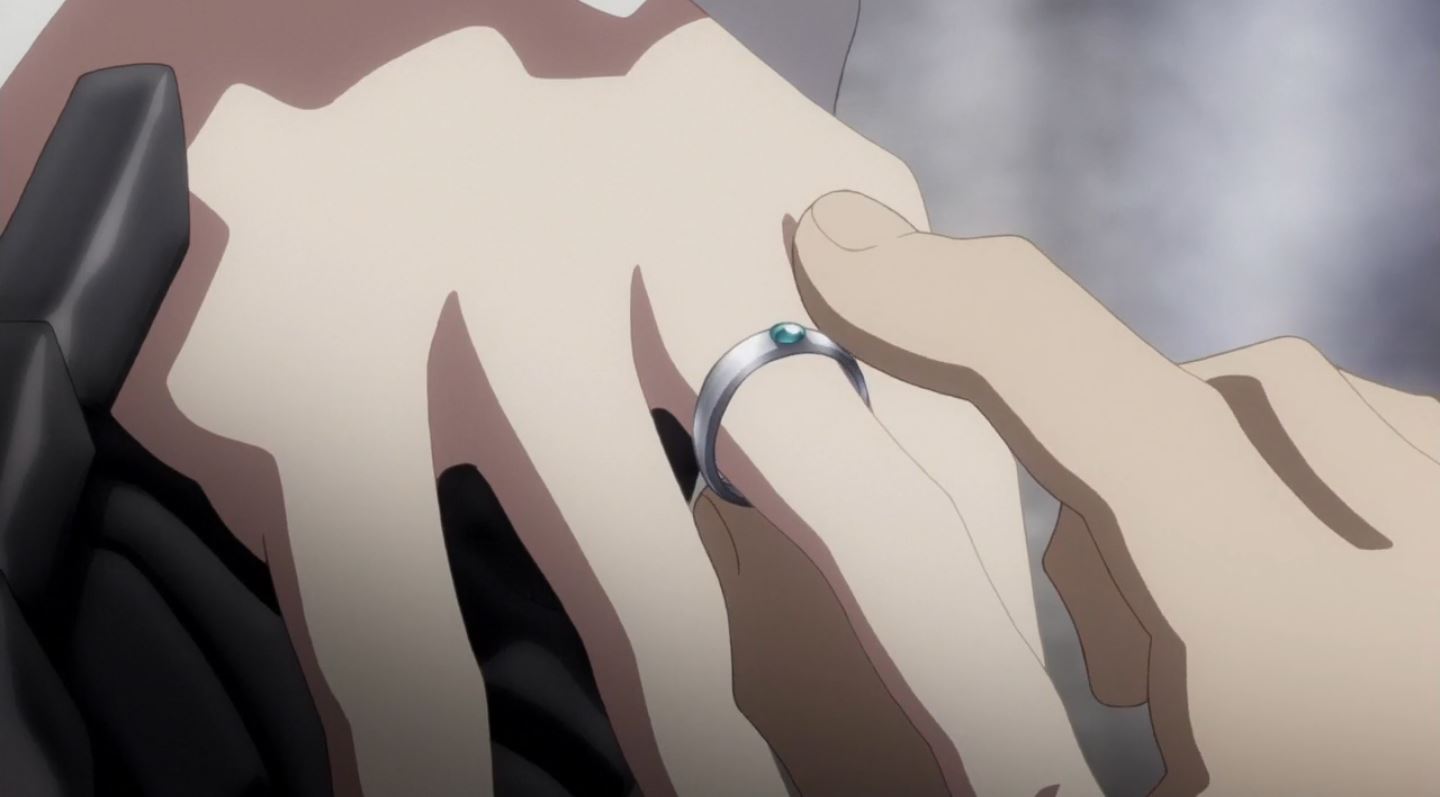
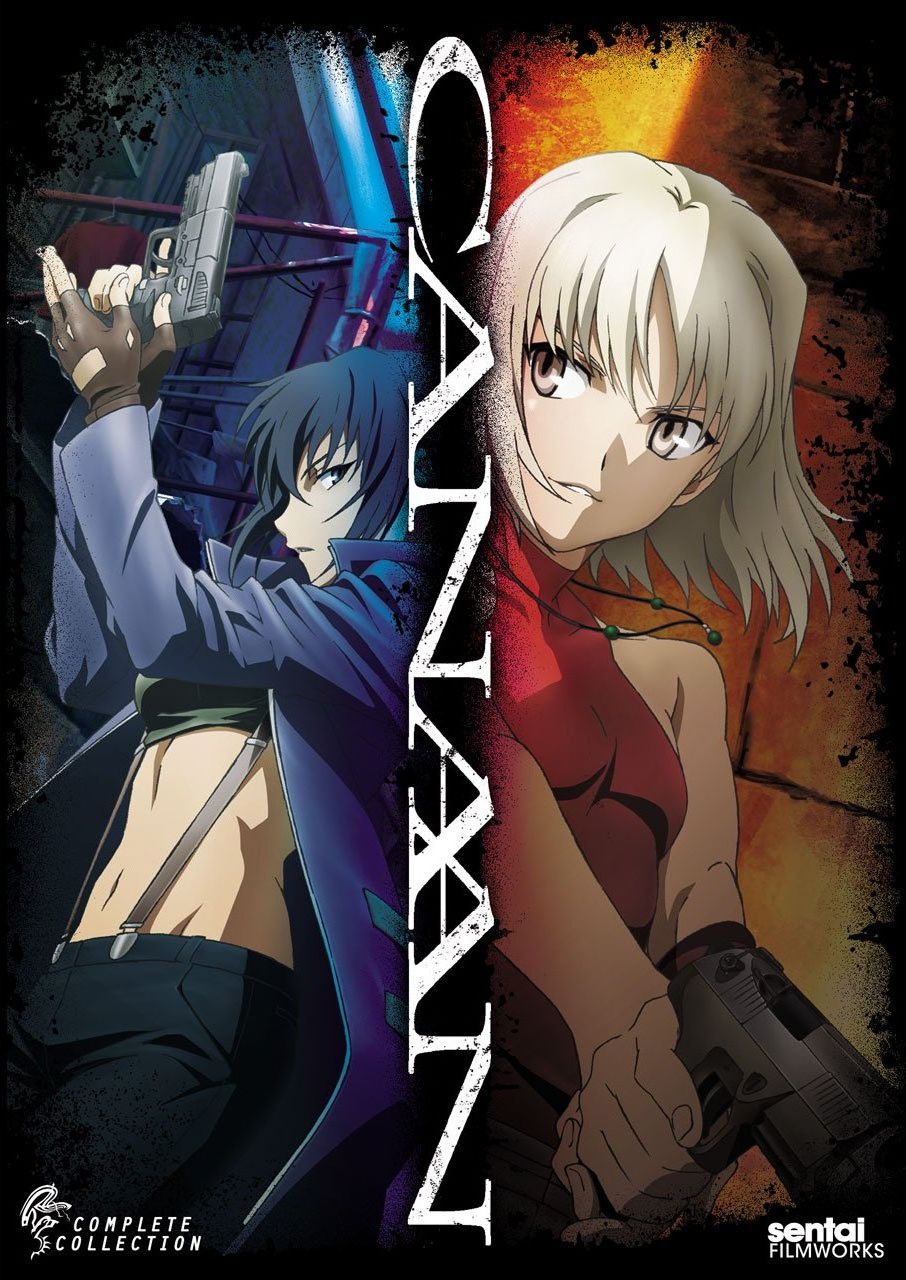
I’ve had this tab open ever since this essay came out, so I’m just going to stop and comment now at long last 😆
I was so surprised that Cyberpunk Edgelord got Anime of the year on Crunchyroll I think it was. Hot take: David was such a flat character who sulked a little too much in my opinion. It was kind of like watching Hayden Christensen turn Anakin from neutral good to … neutral evil that was as arbitrary as it was wooden.
Coming from an Arts degree, seeing nakedness as a titillating device as opposed to the nude figure used symbolically frustrates me. I had to go to a definitely not secure website to quickly look up all the scenes with nudity because I couldn’t fathom it being meaningful. The nudity in that show just wasn’t my thing anyway so there wasn’t much titillating about it in the first place. However, I definitely got more than a little bit of eye candy vibery from it. Especially the establishing shot at some cyber fantasy brothel that just lingered in it.
The most poignant scenes of course were the ones of them sitting on the bench at night naked with the contrast between his huge muscle modded body and her somewhat more normal shape. However, I didn’t really get as strong of a symbolic counterpoise between the two of them as Lucy definitely has lots of mods. Maybe I missed a scene or two where it firmly establishes her dislike of tech in her body? Are we also supposed to assume she got a boob job?
Not sure what I think of the term male gaze but sexualized/ objectified gaze is fine. Mad Men is an excellent example of how showing rampant chauvinism ended up actually just taking part in objectifying women while letting viewers feel morally superior to the characters objectifying them.
But back to Edgerunners, it seems to me that cyberpunk dystopians think they get a fan service pass because cyber dystopia is inherently transhumanist. But I got to say the only place I’ve seen that used meaningfully is in Altered Carbon season 1. (Come to think of it, if you wrote about Altered Carbon inside an essay about a transhumanist anime, that would be awesome).
You’re correct that most of the nudity aims at being fan-service. Whenever I write reviews like this, I try to be a little charitable with what appears to be aimed at. I chalked Lucy’s possible boob job to her character design. All the designs in the anime are exaggerated.
I tend to be harsh on men objectifying women. I view it as immature, and my Christian background equally condemns it. Admiring and feeling attracted are different matters, however. But you are right. This can be a storytelling tool if handled write. And it’s usually not handled right. Ghost in the Shell, in the anime at least, handles it well as a means of character development.
I haven’t seen Altered Carbon yet. It sounds like a story I need to add to my list. Transhumanism is an interesting topic; one that people limit to cybernetics. Transhumanism is already a thing thanks to the phones in our pockets, but I need to think and research this more before I can develop that thought.
Not only did you not play the game, but failed to do even a tiny amount of research on the game and setting at all.
This issue helps keep you from understanding basic points about the setting of an extremely short anime, and apparently wishing that extremely short anime had painted as sufficient of a picture as anime 3 to 4 times is length.
You are correct that I didn’t play the game. I did, however, research it but opted to leave that research out of the article. Stories need to stand on their own without relying on the audience playing the game or reading the manga previously. Now, if the anime was framed as a sequel to the game, I wouldn’t make this stand. Sequels and series entries by their nature depend on previous entries. I agree with you about the length of the anime. It wasn’t long enough to tell the story it wants to tell.
I’ve only watched the first episode, but based on your review, it sounds like the “cyberpunkness” of Cyberpunk: Edgerunners was more of a decorative element than a platform for exploring the topics you mentioned. You cite Lucy as a Faye Valentine-type, so I would compare Cowboy Bebop (and Edgerunners by extension) to GITS: Bebop has relatively normal stories about people in the future, whereas GITS believes the kinds of stories people can tell in the first place is radically different thanks to the future. Bebop is a futuristic space Western, and GITS (SAC in particular) is a crime thriller analyzing the impacts of networked society on individuals.
Bebop and Ghost explore the human condition, but from different angles. Bebop looks deep into trying to evade one’s past. Ghost explores how technology can divorce the mind from the body, and the dehumanization that can cause. Some of the most human characters in Ghost are the full-AI characters. Bebop has a strong found-family theme. Ghost in the Shell and Cowboy Bebop are required watches for anime fans! Although I have to add that I like Samurai Champloo a little more than Cowboy Bebop.
Ha- for some reason that gave me the idea of an essay pitting the execution of motifs inside a bunch of different animes against each other and making your own ranking list.
Best found family, best of the human condition, best of forgiveness, best of memory and loss, best version of a Tsundere’s transformation, best innocence, best loss of innocence, best satire, best paradise lost, best social critique, etc.
See now Chris, you got me thinking again 😄
That sounds like a fun list! I’d have to put Samurai Champloo’s found family at the top of my list.